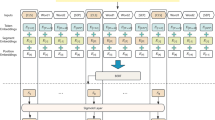Abstract
The extractive automatic summarization method is capable of quickly and efficiently generating summaries through the steps of scoring, extracting and eliminating redundant sentences. Currently, most extractive methods utilize deep learning technology to treat automatic summarization as a binary classification task. However, the effectiveness of automatic summarization for Chinese long text is limited by the maximum input length of the model, and it requires a large amount of training data. This paper proposes an unsupervised extractive automatic summarization method which solves the long text encoding problem by incorporating contextual semantics into sentence-level encoding. Firstly, we obtain the semantic representation of sentences by using the RoBERTa model. Secondly, we propose an improved k-Means algorithm to cluster sentence representations. By defining sparse and dense clusters, we improve the accuracy of summary sentence selection while preserving maximum semantic information from the original text. Experimental results on the CAIL2020 dataset show that our method outperforms baselines by 6.64/7.68/7.14% respectively on ROUGE-1/2/L. Moreover, we further enhance the automatic summarization results by 4.5/5.36/3.24% by adding domain rules tailored to the dataset’s characteristics.
Access this chapter
Tax calculation will be finalised at checkout
Purchases are for personal use only
Similar content being viewed by others
References
Nallapati, R., Zhai, F., Zhou, B.: SummaRuNNer: a recurrent neural network based sequence model for extractive summarization of documents. In: Proceedings of the AAAI Conference on Artificial Intelligence, vol. 31 (2017)
Yang, S., Zhang, S., Fang, M., Yang, F., Liu, S.: A hierarchical representation model based on Longformer and transformer for extractive summarization. Electronics 11(11), 1706 (2022)
Gu, N., Ash, E., Hahnloser, R.: MemSum: extractive summarization of long documents using multi-step episodic Markov decision processes. In: Proceedings of the 60th Annual Meeting of the Association for Computational Linguistics (Volume 1: Long Papers), pp. 6507–6522 (2022)
Lafferty, J., McCallum, A., Pereira, F.C.: Conditional random fields: probabilistic models for segmenting and labeling sequence data (2001)
Vaswani, A., et al.: Attention is all you need. In: Advances in Neural Information Processing Systems, vol. 30 (2017)
Cho, K., et al.: Learning phrase representations using RNN encoder–decoder for statistical machine translation. In: Proceedings of the 2014 Conference on Empirical Methods in Natural Language Processing (EMNLP), pp. 1724–1734 (2014)
Sutskever, I., Vinyals, O., Le, Q.V.: Sequence to sequence learning with neural networks. In: Advances in Neural Information Processing Systems, vol. 27 (2014)
Rush, A.M., Chopra, S., Weston, J.: A neural attention model for abstractive sentence summarization. In: Proceedings of the 2015 Conference on Empirical Methods in Natural Language Processing, pp. 379–389 (2015)
Cheng, J., Lapata, M.: Neural summarization by extracting sentences and words. In: Proceedings of the 54th Annual Meeting of the Association for Computational Linguistics (Volume 1: Long Papers), pp. 484–494 (2016)
Mikolov, T., Chen, K., Corrado, G., Dean, J.: Efficient estimation of word representations in vector space. arXiv preprint arXiv:1301.3781 (2013)
Pennington, J., Socher, R., Manning, C.D.: Glove: global vectors for word representation. In: Proceedings of the 2014 Conference on Empirical Methods in Natural Language Processing (EMNLP), pp. 1532–1543 (2014)
Zhang, X., Wei, F., Zhou, M.: HiBERT: document level pre-training of hierarchical bidirectional transformers for document summarization. In: Proceedings of the 57th Annual Meeting of the Association for Computational Linguistics, pp. 5059–5069 (2019)
Liu, Y., Lapata, M.: Text summarization with pretrained encoders. In: Proceedings of the 2019 Conference on Empirical Methods in Natural Language Processing and the 9th International Joint Conference on Natural Language Processing (EMNLPIJCNLP), pp. 3730–3740 (2019)
Narayan, S., Cohen, S.B., Lapata, M.: Ranking sentences for extractive summarization with reinforcement learning. In: Proceedings of the 2018 Conference of the North American Chapter of the Association for Computational Linguistics: Human Language Technologies, Volume 1 (Long Papers), pp. 1747–1759 (2018)
Wu, Y., Hu, B.: Learning to extract coherent summary via deep reinforcement learning. In: Proceedings of the AAAI Conference on Artificial Intelligence, vol. 32 (2018)
Chen, Y.C., Bansal, M.: Fast abstractive summarization with reinforce-selected sentence rewriting. In: Proceedings of the 56th Annual Meeting of the Association for Computational Linguistics (Volume 1: Long Papers), pp. 675–686 (2018)
Liang, X., Li, J., Wu, S., Li, M., Li, Z.: Improving unsupervised extractive summarization by jointly modeling facet and redundancy. IEEE/ACM Trans. Audio Speech Lang. Process. 30, 1546–1557 (2021)
Liu, Y., et al.: RoBERTa: a robustly optimized BERT pretraining approach. arXiv preprint arXiv:1907.11692 (2019)
Kenton, J.D.M.W.C., Toutanova, L.K.: BERT: pre-training of deep bidirectional transformers for language understanding. In: Proceedings of NAACL-HLT, pp. 4171–4186 (2019)
Rouge, L.C.: A package for automatic evaluation of summaries. In: Proceedings of Workshop on Text Summarization of ACL, Spain (2004)
Mihalcea, R., Tarau, P.: TextRank: bringing order into text. In: Proceedings of the 2004 Conference on Empirical Methods in Natural Language Processing, pp. 404–411 (2004)
Miller, D.: Leveraging bert for extractive text summarization on lectures. arXiv preprint arXiv:1906.04165 (2019)
Van der Maaten, L., Hinton, G.: Visualizing data using t-SNE. J. Mach. Learn. Res. 9(11) (2008)
Acknowledgement
This research work is supported by the National Natural Science Foundation of China (Grant No. 61972266).
Author information
Authors and Affiliations
Corresponding author
Editor information
Editors and Affiliations
Rights and permissions
Copyright information
© 2023 The Author(s), under exclusive license to Springer Nature Switzerland AG
About this paper
Cite this paper
Zhu, J., Duan, W., Yu, N., Pan, X., Fan, C. (2023). An Extractive Automatic Summarization Method for Chinese Long Text. In: Yang, X., et al. Advanced Data Mining and Applications. ADMA 2023. Lecture Notes in Computer Science(), vol 14177. Springer, Cham. https://doi.org/10.1007/978-3-031-46664-9_22
Download citation
DOI: https://doi.org/10.1007/978-3-031-46664-9_22
Published:
Publisher Name: Springer, Cham
Print ISBN: 978-3-031-46663-2
Online ISBN: 978-3-031-46664-9
eBook Packages: Computer ScienceComputer Science (R0)




